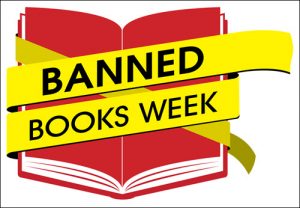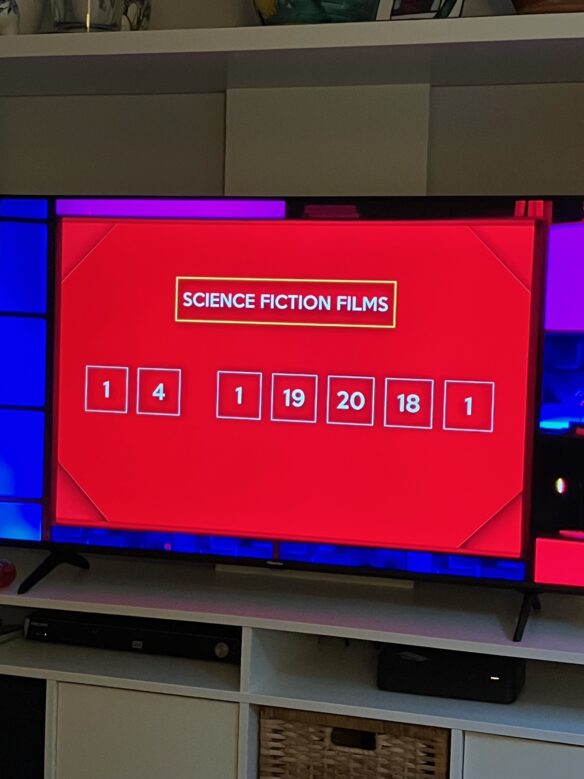(1) SELLING FANTASY. [Item by Andrew (Not Werdna).] “Lester del Rey invented the fantasy genre in book publishing” alleges Slate’s Dan Sinykin.
Lester del Rey wore 1950s-style horn-rimmed glasses, an unruly billy-goat beard, and his silver hair brushed back above a big forehead. He liberally dispensed cards that said: Lester del Rey, Expert. He sometimes said his full name was Ramón Felipe San Juan Mario Silvio Enrico Smith Heathcourt-Brace Sierra y Alvarez-del Rey y de los Verdes. He was in fact born Leonard Knapp, son of Wright Knapp, in 1915 in rural southeastern Minnesota, subject to the Minnesotan fever—Jay Gatz, Prince Rogers Nelson, Robert Zimmerman—for reinventing oneself. In 1977, del Rey, then in his 60s, turned his proclivity for fabulism to profit: He invented fantasy fiction as we know it….
(2) PAYING OUR RESPECTS. Condolences to Cora Buhlert whose father passed away today.
(3) JUMP ON THE BANNED WAGON. “Banned Books Week: PRH’s ‘Banned Wagon’ Hits the Road” – Publishing Perspectives has the story. Banned Books Week is October 1-7. The tour schedule is at the link. The dozen showcased books include two genre works, The Handmaid’s Tale and Too Bright to See.

The arrival of this year’s Banned Books Week—led by one of the most comprehensive coalitions of free-expression organizations in the business–is themed Let Freedom Read. Engaged in the effort are the American Library Association, Amnesty International USA, the Authors Guild, the Comic Book Legal Defense Fund, the National Book Foundation, PEN America, and the Center for the Book at the Library of Congress, among others.
Hearing the call, Penguin Random House–the world’s largest and most internationally positioned of trade publishers– is gassing up something new: its “Banned Wagon: A Vehicle for Change.”
The goal is to take the debate right into the American South during Banned Books Week. Putting wheels on its “Read Banned Books” message, the vehicle not only will showcase a selection of 12 of the publisher’s frequently challenged books but will also distribute free copies of those books to attendees in each of the cities in which the tour makes a stop….
These are the 12 books published by Penguin Random House and being loaded into the Banned Wagon as it rolls through the American South during Banned Books Week.
- I Know Why the Caged Bird Sings by Maya Angelou
- The Handmaid’s Taleby Margaret Atwood
- Shout by Laurie Halse Anderson
- I Am Jazz by Jessica Herthel and Jazz Jennings
- The Kite Runner by Khaled Hosseini
- How to Be an Antiracist by Ibram X. Kendi
- The Magic Fish by Trung Le Nguyen
- Too Bright to See by Kyle Lukoff
- The Bluest Eye by Toni Morrison
- Pride: The Story of Harvey Milk and the Rainbow Flag by Rob Sanders
- The Immortal Life of Henrietta Lacks by Rebecca Skloot
- Dear Martin by Nic Stone
(4) CHENGDU WORLDCON ROUNDUP. [Item by Ersatz Culture.]
Chengdu Worldcon makes Chinese-language-only announcement about attending registration and participation rules
This has been published on the official Chinese-language site, WeChat and Weibo, but as of 19:00 BST, I haven’t seen any equivalent English language statement. As such this item is very dependent on machine translation, and could contain misunderstandings. However, the text has been run through Google Translate, DeepL and Vivaldi Lingvanex, with similar results output each time.
This is the Google Translate version of the main text of the page on the official site: https://www.chengduworldcon.com/Xnews/275.html
2023 Chengdu World Science Fiction Convention Membership Registration and Drawing Participation Rules for Three Major Ceremonies Released
Release time: 2023-10-01 12:42
Dear fantasy fans:
Thank you for your attention to the 2023 Chengdu World Science Fiction Conference. From now on, the WeChat applet for membership certificate registration (“Exhibition Hall Appointment”) is officially launched. Members who purchase offline conference passes need to register through the mini program [DeepL translates this as “app”] to obtain the QR code for the replacement certificate. The membership certificate [DeepL translates this as “membership ID”] exchanged with this code on site will be your only voucher [DeepL translates this as “credentials”] for entering the venue during the conference. Please log in and register in time.
In accordance with the convention [DeepL translates this as “usual practice”] of the World Science Fiction Convention, the opening ceremony, Hugo Award Ceremony and Closing Ceremony will have a maximum number of on-site spectators. This conference will confirm the offline participation pass members who will participate in the opening ceremony, Hugo Award ceremony and closing ceremony through online lottery in advance.
There’s a QR code which I presume links to the aforementioned WeChat applet, followed by details of the various rules and regulations; the bits that I thought noteworthy are:
- From now until 24:00 on October 9, members with offline participation passes can register for certification by searching the “Exhibition Hall Appointment” WeChat applet.
- The lottery will be sorted according to the information about the intended viewing activities filled in by each member, and will be notarized and implemented by the Shudu Notary Office in Chengdu, Sichuan Province. Each winning member can only participate in one grand ceremony. The winning results will be sent to the winning members via SMS in a timely manner.
- Starting from 15:00 on October 13, you can check the lottery results through the official website of the 2023 Chengdu World Science Fiction Conference and the “Exhibition Hall Appointment” WeChat applet.
- The results of this lottery will not affect participation in other activities such as on-site theme salons and theme exhibitions. The relevant schedule of the theme salon and theme exhibition will be announced soon, so stay tuned.
- The right to interpret these rules belongs to the 2023 Chengdu World Science Fiction Convention Organizing Committee
The QQ link is: https://mp.weixin.qq.com/s/EFcTsNCg0pyt2qbTxVPzJg. The Weibo link is: https://weibo.com/7634468344/NlPaCz8yw (which has received 52 comments as I write this up)
Assuming that my interpretation of this is correct, in that it’s necessary to install the WeChat app on your phone to be able to even get into the con venue, it should be pointed out that concerns have been raised about the security and privacy aspects of that app: https://foundation.mozilla.org/en/privacynotincluded/wechat/ (2001)
I’d previously installed this app on an old unused Android phone (using a test Google account,) and I suspect that many foreign users will struggle to register a WeChat account, as it requires an existing user to verify you via a QR code:
1. Contact a WeChat user who meets the following conditions. (They do not have to be your
WeChat friend.)a. Signed up for WeChat over 1 month ago if they are an international user or over 6
months ago if they are a Chinese Mainland user
b. Hasn’t completed “Help Friend Register” for other users in the past month
c. Hasn’t been blocked in the past month
d. Has activated WeChat Pay if they are a Chinese Mainland user
2. Ask them to scan the following QR code using WeChat.


It has since been pointed out to me that the previously announced “100th Light-second Plan” covers some of this (maybe)? That indicated that if attendees email the provided address, they will gain access to a “reservation channel” for the opening and Hugo ceremonies.



This doesn’t directly address the implication in today’s announcement that you need WeChat to enter the con venue – and I note that it only talks about the opening and Hugo ceremonies, not the closing ceremony – but maybe this hints that this has already been thought about? On the other hand, I must confess I’m more than a bit uncomfortable at the idea that foreigners get privileged access to some of the main events, but locals have to take their chances in a lottery.
For reference, here are a couple of screenshots I was sent of what the WeChat app registration looks like.


(5) WHO SPEAKS FOR THE TREES? Alyssa Hall considers “’The Long Defeat’: Reading Tolkien in the Time of Climate Change” at Tor.com.
Allegorical readings of The Lord of the Rings vexed Tolkien. In the Foreword to the second edition of the books, he wrote of his distaste for allegory altogether: “I much prefer history, true or feigned.” The environmentalism that’s evident throughout his chronicles of Middle-earth, from the rebellion of Fangorn Forest to the Scouring of the Shire to the destruction of the Two Trees of Valinor? That was all based in history and autobiography, from a childhood in which “the country in which I lived was being shabbily destroyed before I was ten,” only made mythic.
Before I was ten, the third in a series of international scientific reports on our warming Earth was published, and the Kyoto Protocol set targets for countries to reduce their greenhouse gas emissions. Prior to those developments, Svante Arrhenius had connected the burning of coal to rising carbon dioxide levels and hotter climates; John Tyndall had identified the gases responsible for the greenhouse effect; and Eunice Foote had realized that carbon dioxide gas could trap heat from the sun. In fact, Arrhenius did his work long before I was born, near the beginning of Tolkien’s own lifetime; Tyndall and Foote, before Tolkien was born.
When it comes to what is true and what has been feigned, the historicity of climate change is an established fact, and the willful denial of its reality is a toxic fiction. Climate change was already occurring during the years when Tolkien lived and wrote. Though he may not have been aware of a growing knowledge of global warming, I think his work is directly applicable to all of us who face the current onslaught of frightening headlines about climate disasters and think, like Frodo, “I wish it need not have happened in my time.” Tolkien, if not a professed environmentalist, was certainly a pastoralist, a lover of trees and countryside and an opposer of polluting industrialization. Ents, Eagles, Beornings, and other forms of nature personified fill his work, as do plot points and revelations that hinge on the destruction of one or more trees (or Trees). His letters put it even more plainly: “The savage sound of an electric saw is never silent wherever trees are still found growing.” Climate change is industrial deforestation writ large. For me, there’s no author who gives the natural world its due the way Tolkien does.
With Amazon’s The Rings of Power series driving a new pop-cultural wave of interest in Middle-earth at the same time global temperatures are shattering records and driving extreme weather events around the world, I’ve found myself longing for Tolkien or a Tolkien-like voice of the twentieth-first century: Someone pouring out words about the living world, writing that emerges from unabashed, earnest love for nature. The mounting threat of climate change has me returning to my childhood favorites to seek wisdom for these long defeats in this Century of Disasters, to look for a light forward in dark times for the planet and its inhabitants….
(6) RECORD SETTING RESENTMENT. The Guardian lists the “Top 10 grudge holders in fiction”. No. 4 in the list is —
The Employees: A Workplace Novel of the 22nd Century by Olga Ravn, translated by Martin Aitken
“Ravn’s novel is set on the Six-Thousand Ship, which is orbiting a faraway planet New Discovery, where the crew has discovered a number of strange objects. The book is structured around a series of recorded statements, of varied degrees of redaction and fullness, made by the ship’s human and humanoid crew to some kind of committee about the effects of these objects upon themselves. The objects have the effect of defamiliarising the workplace for the crew, making them see it anew, making them realise their lives might have meaning beyond work. Over the course of the book, their resentment against their employers grows and grows.”
Several others are genre by virtue of being ghost stories of one kind or another.
(7) SERIES KILLER. Hugo voting closed yesterday. Nicholas Whyte has something he’d like to say: “2023 Hugos: Best Series – why I voted No Award” at From the Heart of Europe.
I voted No Award for this year’s Hugo Award for Best Series. I think the category is a bad idea in principle which is now showing its limitations in practice. My objections are as follows:
- The Hugos ought to celebrate the best activity of the previous year, and only the previous year. For some of the other categories (Semiprozine, Fanzine, Fancast), earlier work is taken into account to determine eligibility, but the award is clearly for achievements of the previous calendar year. Best Series is inevitably an award for a multi-year set of activities.
- It is impossible for the diligent reader to read all of the work nominated for Best Series in a given year. By giving the award we are deliberately engineering a situation where voters cast their votes based on imperfect knowledge of the finalists.
- We are now seeing repeat nominations for series that have been unsuccessful finalists before. I feel sympathy for authors who must feel that they are waiting for their turn, but that’s not the way an awards system should run…
More analysis, and how he ranked the finalists, at the link.
(8) FREE READ. Sunday Morning Transport encourages subscriptions with this story by John Chu, “Halfway Between Albany and West Point”.
October kicks off with John Chu’s thrilling vision of academia and his spectacularly embattled graduate student.
(9) TANKS FOR THE MEMORIES. “Toxic Avenger Remake Trailer: First Look at Peter Dinklage Film” – Gizmodo provides a gloss and a warning.
…Directed by Macon Blair, this new Toxic Avenger stars Game of Thrones fan favorite Peter Dinklage as Winston, a widower struggling to raise a stepson played by Jacob Tremblay. When his job, run by an evil corporate ass played by Kevin Bacon, won’t pay for health insurance, Winston fights back and ends up in a vat of toxic waste. Now, you don’t see really any of that in this first teaser (note that it’s very much NSFW!), but take that story and put it in this world, and you begin to get the idea of what this movie is….
(10) TODAY’S BIRTHDAYS.
[Compiled by Cat Eldridge.]
- Born October 1, 1914 — Donald Wollheim, 1914 – 1990. Created DAW Books. NolaCon II (1988) guest of honor. Founding member of the Futurians, Wollheim organized what was later deemed the first American science fiction convention, when a group from New York met with a group from Philadelphia on October 22, 1936 in Philadelphia. As an editor, he published Le Guin’s first two novels as an Ace Double. And would someone please explain to me how he published an unauthorized paperback edition of The Lord of the Rings? (Died 1990.)
- Born October 1, 1930 — Richard Harris. One of the Dumbledores in the Potter film franchise. He also played King Arthur in Camelot, Richard the Lion Hearted in Robin and Marian, Gulliver in Gulliver’s Travels, James Parker in Tarzan, the Ape Man and he voiced Opal in Kaena: The Prophecy. His acting in Tarzan, the Ape Man him a nominee for the Golden Raspberry Award for Worst Actor. Anyone seen that film? And why it got him that nomination? I saw the film a long time ago but don’t it clearly enough to say why this is so. (Died 2002.)
- Born October 1, 1935 — Dame Julie Andrews, DBE, 88. Mary Poppins! I could stop there but I won’t. (Hee.) She had a scene cut in which was a maid in The Return of the Pink Panther, and she’s uncredited as the singing voice of Ainsley Jarvis in The Pink Panther Strikes Again. Yet again she’s uncredited in a Panther film, this time as chairwoman in Trail of the Pink Panther. She voices Queen Lillian in Sherk 2, Shrek the Third and Shrek Forever After. And she’s the voice of Karathen in Aquaman.
- Born October 1, 1943 — Sharon Jarvis, 80. Did I ever tell you that aliases give me a mild headache? Well, they do. She did a splendid trilogy of somewhat erotic planetary adventures called These Lawless Worlds that Ellen Kozak co-wrote. She wrote two more series, charitably called pulp, one as Johanna Hailey and another as Kathleen Buckley. Now more interestingly to me, she was an editor in the early day, Seventies and Eighties. I’m going to quote at length from her website: “Sharon Jarvis has worked in the print media for more than twenty-five years for newspaper, magazine and in publishing companies. She has built a reputation for her market-wise expertise in the cutthroat world of publishing. Ms. Jarvis has been a sought-after editor from her days at Ballantine where she helped promote the billion-dollar science fiction boom. At Doubleday she was the acquisitions editor and worked with some of the biggest names in science fiction, including Isaac Asimov, Marion Zimmer Bradley and Harlan Ellison. At Playboy Press, Ms. Jarvis developed, instituted and promoted the science fiction line which helped sustain the publisher through many a setback in other general lines.”
- Born October 1, 1944 — Rick Katze, 79. A Boston fan and member of NESFA and MCFI. He’s chaired three Boskones, and worked many Worldcons. Quoting Fancyclopedia 3: “A lawyer professionally, he was counsel to the Connie Bailout Committee and negotiated the purchase of Connie’s [1983 Worldcon’s] unpaid non-fannish debt at about sixty cents on the dollar.” He’s an active editor for the NESFA Press, including the six-volume Best of Poul Anderson series.
- Born October 1, 1948 — Michael Ashley, 75. Way, way too prolific to cover in any detail so I’ll single out a few of his endeavors. The first, his magnificent The History of the Science Fiction Magazine, 1926 – 1965; the second being the companion series, The Time Machines: The Story of the Science-Fiction Pulp Magazines from the Beginning to 1990. This not to slight anything else he has done such as The Gernsback Days: A Study in the Evolution of Modern Science Fiction from 1911 to 1936.
- Born October 1, 1964 — John Ridley, 59. Author of Those Who Walk in Darkness and What Fire Cannot Burn novels. Both excellent though high on the violence cringe scale. Writer on the Static Shock and Justice League series. Writer, The Authority: human on the inside graphic novel. And apparently the writer for Team Knight Rider, a female version of Knight Rider that would last one season in the Nineties.
- Born October 1, 1989 — Brie Larson, 34. Captain Marvel in the Marvel film universe. She’s also been in Kong: Skull Island as Mason Weaver, and plays Kit in the Unicorn Store which she also directed and produced. Her first genre role was Rachael in the “Into the Fire” of Touched by an Angel series; she also appeared as Krista Eisenburg in the “Slam” episode of Ghost Whisperer. She’s in The Marvels, scheduled out next month.
(11) COMICS SECTION.
- Tom Gauld has a sneak peek at a celebrity bio.
(12) SCIFI IN HOUSE OF GAMES. [Item by Steven French.] During the week BBC2 runs a nightly half-hour quiz show called House of Games in which each round features a different kind of puzzle and not even the host (Richard Osman, now perhaps even more well known as a crime writer) knows what kind is coming up next.
Watching a repeat from last year I noticed that one round featured science fiction movies whose titles were given in code; e.g.:
1 4 1 19 20 18 1
which one of the contestants got pretty quickly even though she’d never seen or even heard of the film!


(13) MORE THAN A SNOWBALL FIGHT. “What would happen if Russia invaded Finland? I went to a giant war game in London to find out” — the Guardian’s Tom Lamont brings back the story.
… It is 10am. Banks asks everyone present to imagine they are on the threshold of geopolitical catastrophe, somewhere a little beyond, though not that far beyond, our current perilous state. He fleshes out a scenario. Prolonged and humbling conflict in Ukraine as well as Finland’s recent accession to Nato has tested Russian pride to breaking point. Worsening matters, Nato has decided to press its advantage in the region by staging a military exercise on the Finnish-Russian border. China, Iran and India have made it plain: they’re not impressed by Nato. The Swedes are jangly, too. Spy planes, satellites and troop carriers are in play. A few wrong moves and all this posturing and provocation could ignite into something far worse. It is up to the players assembled in Bush House to try to war-game us back from the brink.
Now Banks moves among the crowd, handing out jobs like sweets. During this phase of a game, a real-life general might get a tap on the shoulder and tumble to become a low-level functionary for the first time in decades. A career shit-eater might get to feed somebody else the shit. (Maybe the general.) Anyone – a data specialist, a science nerd, an archive-dwelling academic – might find themselves near-omnipotent for the day. With a pointed finger, Banks elevates four random people to play as Russian high command. In a corner of one of the conference rooms, put aside for their exclusive use, the four newly minted Russians are told they can organise themselves and their decision-making however they want. “If you want to be equals here, that’s fine,” says one of Banks’s PhD students. “Or if you want to appoint a dictator, that’s fine, too.”…
(14) A DIFFERENT CHORD. “Queen guitarist Brian May helps NASA return asteroid sample to Earth” at USA Today.
When he’s not rocking out on stage as a founding member of Queen, Brian May enjoys a healthy scientific interest in outer space.
But it’s no mere hobby for the 76-year-old guitar legend to gaze upon the stars or research the nature of the universe. May, an accomplished scientist who has a doctorate in astrophysics, recently helped NASA return its first ever asteroid sample to Earth.
The sample consisting of rocks and dust was obtained from the asteroid Bennu and arrived Sunday back in Earth’s orbit. May was an integral part of the mission, creating stereoscopic images that allowed the mission’s leader and team to find a safe landing spot on the asteroid, which has the potential to crash into Earth sometime in the future…
(15) WHEN THINGS GO BUMP IN THE NIGHT. The New York Times discusses a hypothesis: “Saturn’s Rings May Have Formed in a Surprisingly Recent Crash of 2 Moons”.
Try to imagine Saturn without its signature rings. Now picture two large icy moons shifting closer together little by little until — boom. Chaos. What was solid is now fluid. Diamantine shards scatter into the darkness. Many icy fragments tumble close to Saturn, remain there and dance around the gas giant in unison, ultimately forging the heavyweight body’s exquisite discs.
This spectacular scene comes from an attempt to answer one of the greatest mysteries of the solar system: Where did Saturn’s rings come from, and when did they form?
A study, published this week in The Astrophysical Journal, leans into the notion that they are not billions of years old, but were crafted in the recent astronomic past—perhaps by the collision of two modestly sized frost-flecked moons only a few hundred million years ago.
“I’m sure it would have been great to see if the dinosaurs had had a good enough telescope,” said Jacob Kegerreis, a research scientist at NASA’s Ames Research Center in Mountain View, Calif., and one of the study’s authors….
(16) DREAM HOMES. The New York Times speculates “Maybe in Your Lifetime, People Will Live on the Moon and Then Mars”. “Through partnerships and 3-D printing, NASA is plotting how to build houses on the moon by 2040.”
… NASA is now plotting a return. This time around, the stay will be long-term. To make it happen, NASA is going to build houses on the moon — ones that can be used not just by astronauts but ordinary civilians as well. They believe that by 2040, Americans will have their first subdivision in space. Living on Mars isn’t far behind. Some in the scientific community say NASA’s timeline is overly ambitious, particularly before a proven success with a new lunar landing. But seven NASA scientists interviewed for this article all said that a 2040 goal for lunar structures is attainable if the agency can continue to hit their benchmarks.
The U.S. space agency will blast a 3-D printer up to the moon and then build structures, layer by additive layer, out of a specialized lunar concrete created from the rock chips, mineral fragments and dust that sits on the top layer of the moon’s cratered surface and billows in poisonous clouds whenever disturbed — a moonshot of a plan made possible through new technology and partnerships with universities and private companies….
(17) VIDEO OF THE DAY. [Item by Danny Sichel.] Math counts as science. So this 14-minute animation by Alan Becker — which begins by providing simple visualizations of basic arithmetical concepts and quickly devolves into an all-out battle with lasers and giant mechs — is science fiction. “Animation vs. Math”.
[Thanks to SF Concatenation’s Jonathan Cowie, Mike Kennedy, Andrew Porter, Bill, Steven French, Danny Sichel, Jeff Smith, Andrew, (Not Werdna), Brown Robin, Ersatz Culture, John King Tarpinian, Chris Barkley, and Cat Eldridge for some of these stories. Title credit belongs to File 770 contributing editor of the day Soon Lee.]
Discover more from File 770
Subscribe to get the latest posts sent to your email.

(2) My deepest condolences to Cora.
(1) Capable of leaving a Lester Del Rey sized and shaped hole through opponents.
(2) Condolences. Been there, don’t want the t-shirt.
(3) Actually, I was on a panel about modern book bans at Capclave this weekend, and started considering how to get my novel sent to and banned in Florida….
(5) Instant reaction:
“But the axes of the Orcs
Caused those Ents to blow their corks
And at Helm’s Deep stage an Arbor Day parade” – The Orcs Marching Song.
Birthdays, Wollheim, ahem, Philcon, the world’s first SF con* (stuff it, Leeds, we were first).
(11) Another line from the same filk:
“Well you may think Sauron’s done
For they did melt down the One
And Morder, as I mentioned, is a mess.
But he had a scheme, I fear,
To exploit the Palantir
And the Eye is seen each night on CBS” (though these days, Faux would be far more appropriate.
(15) That sounds like a story I need to write… and I think I even wrote a scene for it in a class I took from Odyssey Online….
(10) Julie Andrews also wrote a genre children’s novel, “The Last of the Really Great Whangdoodles”, in 1974.
Leeds was first — thanks for playing!
(1) I’m trying to imagine what fantasy publishing as we know it would be without Lester del Rey.
(2) I’m thinking of you, Cora. (I went through something similar about three years ago.)
(10a) I think it was a combination of ballz, access to the text of the original hardbacks, and a personal interpretation of a particular copyright law.
(10b) I don’t think I saw the whole Tarzan movie — I remember being bored. There was a tendency to give that award to well-known actors who ended up in big budget bombs like that.
The first Richard Harris movie I remember seeing was the 1979 movie “Ravagers,” a disjointed post-apocalyptic flick. The Tarzan movie was probably better.
(2) Very sad news
(7) I’ve been sceptical about Best Series – although this year there was only one series I hadn’t read any of when the finalists were announced. To this extent, repeat nominations are more of a feature than a bug e.g. I’d read some of October Daye because of its previous nomination.
Even so, adding a whole trilogy to my Hugo Reading slowed me down a lot. There were Best Related Works I didn’t get to before the cut off for example.
I think Children of Time series being a finalist after the individual books being hampered by UK v US publishing dates is a good advert for the category.
As to how Wollheim came to publish the unauthorized edition of LOTR, this is the short version, as I have heard it. He had approached JRRT about issuing a US paperback edition but was haughtily refused. Wollheim still remembered that affront when he noticed an odd loophole in the LOTR copyright, caused by Allen & Unwin letting too many copies of the books be imported to the US. So in 1965, Wollheim published the unauthorized Ace editions that sparked the great Tolkien craze in the US. When Tolkien and his UK publisher complained, an agreement was negotiated that gave JRRT the appropriate royalties. Ace printed no more copies and Ballantine issued the “authorized editions,” whose covers bore no relation whatsoever to the content of the books, unlike Jack Gaughan’s covers for Ace. But without Wollheim’s daring deed, LOTR might never have had the tremendous cultural impact it did. Sidenote: the lawyer who handled those negotiations, Roy Gainsburg, went on to become head of St. Martin’s Press and thus the ultimate boss of Tor Books in the days of Tom Doherty.
Oh, if anyone still has an Ace set in good condition, they have some collectible value. I recently saw one advertised for $75.
Condolences, Cora.
@Mike
The Leeds fans certainly were first with the idea of doing a science fiction convention. That’s much more important than what is considered to be the first convention (which is always going to be a controversial topic).
Rich Lynch: We always love kicking this around. Leeds had the venue and programmatic traits of a convention. The Philadelphia thing was some fans from New York coming to town and meeting some other fans in a private gathering in somebody’s parents’ living room. (And to my mind, decided to steal the glory from the Leeds organizers from whom they got the idea of a convention in the first place.)
@Mike
I’ve already written my about my thoughts on the topic.
And yeah, I agree that this topic will always be evergreen.
Deepest condolences, Cora.
My condolences to Cora.
(10) Rick Katze stated his age today, on Facebook, as 80.
Years ago, when I was having legal issues with my sister, I was talking to a friend at the NESFA Clubhouse. She said, go tell Rick about this. Rick was of course a vital mainstay of the club, but I had never seen him in lawyer mode, and I was dubious. I trusted her judgment, though, and it was worth a try. I brought my problem to him, and the transformation was downright terrifying. I gave him all the information and paperwork I had. He read it, and gave me both advice and amendments. He was available every time I had another question.
Without ever coming forward in a way that let my sister know that I had talked to a lawyer and Wasn’t Keeping It In The Family (note: my sister is a lawyer, and did consult a lawyer with the relevant expertise at her firm), he got me through much more smoothly, and much better off in the end.
He’s there for his friends, and if you’ve never seen him in lawyer mode, you don’t really know just how smart, capable, and tough he is, professionally, and for friends when that’s what’s needed.
I dunno. Earlier this evening on FB I read Rick discussing his 79 years of life.
Perhaps I’ve slipped in from a minimally alternate universe? Off by just one year?
(4). WeChat app. You really considering downloading that one? People are so naïve. Like letting China host a Worldcon. Who would ever…
Condolences to Cora. I still think about my own dad, who passed away in 1980 at only 58. Wish I’d taken more opportunities to talk with him.
My heartfelt Condolences to Cora.
1
Definitely going to check out Sinykins book. I always love a good publishing history.
I always assumed it was Judy-Lynn who drove the fantasy train, as Lester was a sci-fi guy as a writer. Certainly 1977 was the epochal vintage, whoever was bottling it.
Condolences to Cora, indeed. I remember the day when I had to go and identify my father’s body – and probably will until my own dying day.
Lester del Rey did at least dip a toe into the waters of fantasy writing; he contributed several stories to Campbell’s Unknown, for example. (I could tell you exactly how many, and when, and what I thought of them, but that would involve checking my notes, which would mean standing up, which ain’t gonna happen anytime soon.)
(17) Very cool, and properly cognizant of the First Rule of Animation*
* Nyjnlf unir fbzrguvat punfvat fbzrguvat.
Prior to Lester Del Rey were the Brothers Grimm, the Arthurian Legends, Aesops Fables, and I doubt Tolkien was influenced by Del Ray. The world is much larger than any one man.
Condolences to Cora. It’s hard losing a parent. Most of my family that smoked died of smoking related illness.
RE: Trees, there are MANY places you can donate money to that will plant climate appropriate trees in this world. The Nature Conservancy, The Arbor Day Foundation, One Tree Planted, Plant a Tree Program from the Department of Agriculture, and the list goes on.
Just this last week, a teen cut down the iconic tree that was seen in one of the Robin Hood films. He should be required to plant a thousand trees for such a horror! Why are humans so damned destructive????? WHY????
4) “…that foreigners get privileged access to some of the main events, but locals have to take their chances in a lottery.” Could not be less surprised. That’s because the only reason the CCP is even allowing this to happen in the first place is, like the Olympics, so they can show off their latest Potemkin village to the world. Having locals who already know what life is really like in the Glorious Worker’s Paradise crowd out the sort of tourists who are this sort of event’s stock in trade would defeat that purpose.
10) Skull Island was a better movie than Captain Marvel and Brie Larson was better in the former than the latter.
Before his involvement with what became Del Rey Books, Lester edited the short-lived Fantasy Magazine (four issues in 1953) and the first two issues of the also-short-lived Worlds of Fantasy (four issues, 1968-71). His editorial tastes and attitudes clearly echoed those of Campbell’s Unknown Worlds (where he had published several stories).
My condolences to Cora.
It felt a little bit odd to finish The Employees, put it down, open this site, and immediately see two separate posts that referenced the book.
(I have to say I wasn’t a fan of the book.)
Kyra: Have you tried sleeping on it?
Nobody’s saying that Lester Del Rey invented fantasy — rather, the article is saying that by buying (and heavily promoting) Shannara, Thomas Covenant and Xanth, all in 1977 or thereabouts, he was responsible for creating or codifying fantasy as a bookstore genre.
2.) Condolences to Cora.
5.) I nominate Alma Alexander as the pastoralist writer for the 21st century. Her vision for the River anthology was amazing, and when she sits down to write pastoral works, it’s…well, it’s amazing.
@Mike Glyer–Sleeping on it certainly seems to have worked for Joy. Maybe we should all try that.
Joe H.: That was the way I took their meaning too.
I agree with Joe H., too.
The comments on that article think the article said Lester Del Rey invented fantasy — even though the article itself mentions lots of pre-existing fantasy stories — including the Ballantine Adult Fantasy line. But where did bookstores shelve those books before the 1970s? (How many of those books ended up in the children’s section because no one at the store knew any better?) How did publishers market them, especially if they were by writers better known for their SF? How many stores had much of an SFF section before this era?
Sandra M. gets it right. Houghton-Mifflin got greedy, imported too many copies of the LoTR books from the UK, which violated the Manufacturing Clause of the then-Copyright Act. Incidentally, the Ace LoTR books were such a secret project that Jack Gaughan didn’t get to read the books before doing the cover artwork, hence the flying horse instead of the reptilian flying thing on one of the book covers.
I solved the problem of Chegdu by, first time ever, not nominating for the Hugos, not voting for them, not downloading the Hugo packet. Not going, either. Might have some Chinese food in the near future, though.
@Joe H (et al): Yeah. When I wanted to read LOTR at 12 in the mid 70s, I couldn’t because it was shelved in the “adult fiction” section of the library, along with Tolstoy, Hardy, Benchley and Hailey. It wasn’t marked as “fantasy” – that would have been a very small shelf indeed in 1976 (Watership Down, Tolkien, Lewis’s Space Trilogy, Lord Dunsany, and a few others, perhaps). Shannara got a huge push (the NY Daily News serialized it as a daily comic strip), and a publishing genre was born. Or that’s how I remember it, anyway…
My recollection of bookstore geography (which starts around 1960) is that SF and fantasy that was sufficiently clearly marked by publishers got shelved together. As were, say, mysteries.
Magazine history clearly demonstrates the relative economic success of SF vs fantasy–the pre-war pulps had plenty of each, though it was SF that had the strongest persistent identity on the newsstand. Nevertheless, there were readerships for the various flavors of the non-SF fantastic, even if the marketing machines didn’t successfully break it out as a branding category until Tolkien took hold.
A survey of my own library, 60-plus years in the making and reaching back a decade and more beyond that, would reveal how the fantastic was presented as a publishing category, pre-Tolkien–lots of small presses, along with writer-specific runs (Knopf had reissued Arthur Machen in a uniform yellow-bound hardcovers in the 1920s), publishers with a soft spot for the fantastic (Crown and Collier, for example), and experiments like the Ballantine Adult Fantasy series.
The Slate piece clearly focuses on Del Rey’s gift for branding and marketing–but (perhaps because of his own age and personal experience) he is not, perhaps, aware of how long and deep was Del Rey’s connection with the fantastic as a literary as well as a commercial pursuit.
Filers Sleep on SF…
Or, more likely, fall asleep with an sf book open on their torsos.
SF sleeps on filers
My take on the development of modern, genre fantasy involves DAW, Ballantine, LeGuin, Leiber, Zelazny and Lee, TSR, Avalon Hill, Last Unicorn, etc, so things were afoot by 1977, but the Del Reys were major element in the evolution. Don’t count them out. The author of the book under discussion starting reading fantasy after 1990. They state that they were surprised fantasy was declassé for decades. For those of us of an longer career, we remember things that this author has to learn, for instance that fantasy hid in sf’s shadows for a while mid century till market conditions were ripe.
I maintain that Lester was primarily known as an sf writer. I certainly put him solidly in that camp, just as I do Blish and Knight, despite the fact that all three dabbled in fantasy. Writing fantasy in that period was not a commercially viable option.
Looking forward to reading the book.
Can we at least credit Judy Lyn Del Rey for inventing/pushing the marketing concept of “fat trilogies,” inspired by the mega-success of LOTR? SWORD OF SHANNARA resembled LOTR veerry closely point for point. When reviewer Dick Lupoff demonstrated this in his ALGOL column, the Del Reys stopped buying advertising there.
Andre Norton’s first Witch World novel came out from Ace a year before LOTR. She had a hard time persuading Wollheim to publish it “because there’s no market for fantasy.” His venture with LOTR definitively proved that wrong, eh what?
Cora, I am so sorry for your loss. My deep condolences to you & your family.
My condolences to Cora & family.
“(4) It’s indeed true, but it pertains specifically to those Chinese members who have purchased the physical attending admissions. Considering the substantial number of participants, to ensure smooth entry for the Opening, Closing, and the Hugo Award ceremonies, we have to conduct a draw in advance. This replaces the previous model of early queuing, deciding who can attend these ceremonies rather than having them wait in a futile queue to enter the ceremony hall (since this model could potentially cause on-site chaos). The draw will be conducted on WeChat, which is why we ask our Chinese members to sign up for it in advance. As for the overseas members, just like you mentioned in the post, we have previously launched an Incentive Project for attendees traveling over 3,000 kilometers (a condition that the vast majority of overseas members meet), ensuring their entry to the aforementioned ceremonies. They merely need to make an appearance at the convention to receive their pass and partake in all the events.”
2) Thank you for the kind words, everybody. This is very difficult for me and also very stressful, because I have to deal with all the administrative stuff involved with death on my own, since my Mom isn’t well enough to handle anything.
I had an appointment at the funeral home today to plan all the details and the person I talked to was an SF fan and happy to see photos of my Hugo trophy.
@Mike, thank you for Title Credit.
Sandra Miesel did a good, concise, job of explaining Wolheim’s publication of Lord of the Rings. The only thing I would like to add is that Don told me he had, after publication, sent royalty cheques to Tolkien from the proceeds, which Tolkien steadfastly refused to cash.
As to Fantasy: we all loved Poul Anderson’s “The Broken Sword” rather desperately, and one day one of us (I think it was my brother) asked him how one could write such a wonderful book. And Poul answered that nobody should bother to try, as it was almost impossible to get such a book published. There was simply no market for Fantasy.
Lester himself shed a little more light on his accomplishment when he commented on one of the books he had published. Someone asked “How could you read such crap?” And Lester replied: “I couldn’t read it. But I knew how to promote it!”
And nobody should ever underestimate the importance of Judy Lynn to that team.
Lester used to be described as “A writer whose room has a foot deep pile of crumpled and discarded pages, where at any time you could reach down a find a half empty chocolate milk carton.” Judy Lynn was a dynamo, a woman who could casually turn any mere genius into a very successful genius.
The only sad thing is that both Don and Lester were wonderful writers, and when they turned to editing they stopped writing. I asked Don at dinner one night just why he had stopped writing stories and he said: “I just didn’t have any more stories to tell.”